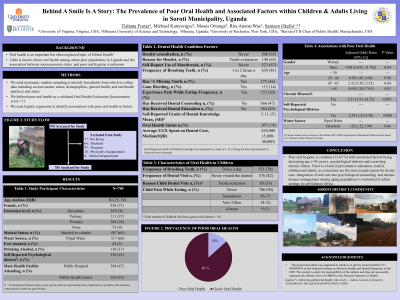Other
537 - Behind A Smile is A Story: The Prevalence of Poor Oral Health & Associated Factors within Adults & Children Living in Soroti Municipality, Uganda


Tishana T. Foster, B.S (she/her/hers)
Dental Student
Rutgers School of Dental Medicine, Newark, NJ
Rutgers School of Dental Medicine
Newark, New Jersey, United States- rA
rita Anane-Wae, B.S
University of Virginia
- MK
Michael Kanyesigye, B.S
Mbrara University of Science & Technology
- dO
daniel Odongo, MMED
Mbrara University of Science & Technology
- MO
Moses Orionga, MBChB
Mbrara University of Science & Technology
- SO
Samson Okello, MBchB,MMED,MSc
Mbrara University of Science & Technology
N/A, North Carolina, United States
Presenting Author(s)
Co-Author(s)
Program Director(s)
Purpose: To identify the prevalence and associations of poor oral health among adults and children living in Soroti, Uganda.
Methods: A cross-sectional study that enrolled participants in every third household within Soroti Municipality. Research assistants obtained consent from head of households and their children. Anthropometric measurements were done on participants and a validated health questionnaire was administered. The answers were converted from a point-scale to a linear score, which confirmed poor oral health from the threshold linear score. Using statistical analysis, STATA15 software, associations were obtained and used for the results.
Results: A total of 991 persons were screened and 785 were analyzed. Females accounted for 71% (n=556) of participants and 43% participants (n=336) reported having psychological distress. In adults, 65% reported no previous dental visit and for those that visited, 62% went for tooth extractions. 81% of adults and 82% of children brushed their teeth 1-2 times a day.
Conclusions: Poor oral hygiene is common (14%). Associated factors include psychological distress, chronic disease and increasing age ( >45years) which had P-values measuring .08, .01 and .04, respectively. 82% of children never visited the dentist and for those that did, 53% went for tooth extractions, a similar pattern in adults, indicating potential discrepancies in preventative oral care. Psychological distress’ association to poor oral health may reveal undiagnosed or untreated mental illness as an increased risk for dental carries. Emphasis of preventative oral care services is warranted in both pediatric and adult populations, to promote better oral hygiene practices and health education in sub-Saharan Africa.
Identify Supporting Agency and Grant Number: The project described was supported in whole or in part by Award Number T37 MD008659 of the National Institute on Minority Health and Health Disparities of the NIH.

.jpg)